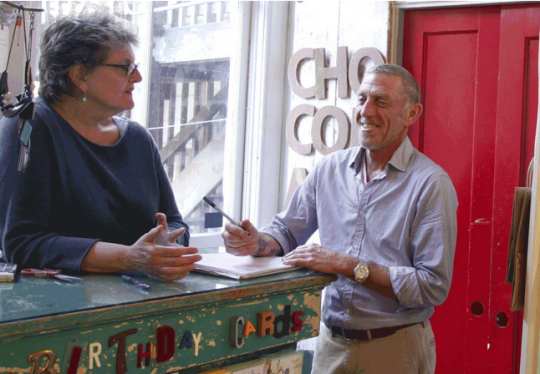A guy whose LinkedIn contacts endorse him for skills in molecular biology, neuroscience, and biomedical engineering seems an unlikely candidate to be co-founder of a website that serves small businesses. But growing up the son of entrepreneurs in North Carolina, Rohit Prakash saw a need that wasn’t being met in the small business community: an online network.
In 2012, Prakash and his friend of 10 years, Nipul Patel, sold a few private investors—namely, their parents—on the idea of a building a social platform online that would link small business owners to others in their own towns. The duo went door-to-door in their San Francisco neighborhood to sign up the first 50 members of their site, Townsquared. The platform, which went on to raise more than $5 million from investors in 2014, is now helping several thousand businesses in neighborhoods in San Francisco, Oakland, Calif., and New York City to leverage their collective knowledge to help each other.
“Some local store owners in our network are using the site to head off dangerous activity before it spreads or gets worse,” a company spokesperson told Yahoo Small Business. For example, one San Francisco business posted a picture and details about “a transient who allegedly threw objects at customers, screamed at them and even reportedly pulled a knife on a shopper” to alert other shop owners, leading to the assailant’s arrest. In other cases, members use Townsquared’s discussion boards to recommend services to each other, establish partnerships, or share advice and tools, such as pricing guns. “They can send a message to the owner next door to ask for a referral to a plumber or just to say, ‘Great sidewalk sale,’” Prakash says.
He and Patel spoke with some 500 business owners over a four-month period while they developed the resource. Their research showed that the likelihood of any business owner knowing other owners nearby was low. And because owners expressed a need to trust that those in the network are who they say they are, the founders established a locked gateway. “Townsquared verifies that owners and their businesses are legitimate, then places them in a private, online neighborhood network based on location,” Prakash says. The platform is not open to the public, nor is it indexed on Google.
While Townsquared caters to small businesses, Prakash says some large businesses are admitted. For instance, he says, “Whole Foods wanted to join our first network. People who work at Whole Foods and Starbucks are part of their local community and have knowledge that can benefit [neighboring businesses].” The solution was to give people from those businesses access to the platform for only their own geographic communities. In other words, no one at Whole Foods headquarters gets to peek in on every community it operates in.
Now that Townsquared has a foothold in Manhattan and the Bay Area, it is emerging from beta to launch in neighborhoods around the country. Prakash says that will happen with the help of local business leaders or “Townsquared ambassadors.”
Thanks to the enthusiasm of local media entrepreneur Kale Kaposhilin, the town of Kingston, NY, population 24,000, is one of Townsquared’s first satellites. “It’s a progressive community that had issues when IBM left the area,” Prakash says. “Kale wanted to launch a Townsquared group there and he got the mayor involved. Now, the site is helping local artists and small businesses bind together.”
The future of his business, says Prakash, “is not about those major metropolitan areas. It’s about us getting it right in small towns and every community we go to.”
How will the founders and their 23 employees in San Francisco and New York make money? By bringing “economies of scale” to provide “value-added services,” says Prakash. He promises that access to the site and “any level of communication” between business owners and staff or industry members will “always be free.” Instead, he says Townsquared will “take a piece” when its services translate to savings for members.
For instance, he says, Townsquared could eventually enable independent coffee shops in San Francisco to pool resources to place larger paper cup orders to achieve savings akin to Starbucks franchisees. The same might go for healthcare insurance and credit card processing services. “There are all sorts of things that will not take away from the uniqueness of your business. If we can act as a conduit for value-added services, then people will want to pay,” Prakash says.
Realizing that vision is several years away, he concedes. “I’d be lying if I said the site was perfect. It is in beta now, and we will make a national push in the next few months.” But eventually, he says, “Every single small town in this country should have a Townsquared site.”
Follow Adrienne Burke on Twitter @adajane





